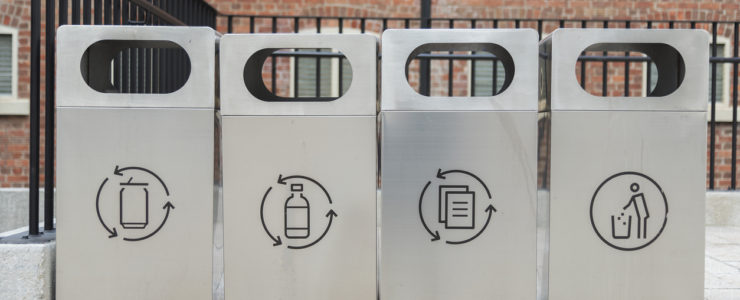
Recycling in the United States has been a fact of life for over 50 years – but in the past year the status quo has shifted.
By raising the standards for acceptable materials to less than 0.5% of contamination in 2018, China (which had previously processed around a quarter of the world’s plastic) effectively threw a wrench in the processes of programs worldwide and stateside. The result has been a proliferation of high-profile coverage proclaiming “chaos” in the recycling industry.
But perhaps even more harmful than the shift in logistics has been the accompanying shift in public perception.
“A crisis of trust is happening,” says Beth Gingold, Founder, Recycling Leaders LLC. “People who used to be enthusiastic about recycling are becoming cynical.”
Ultimately, Gingold says, it’s participation that impacts program success – but if people doubt that recycling is being carried out after they put their materials in the bin, they’re less likely to participate in programs in the first place.
That’s troubling. Because the truth is that recycling matters.
Why Recycling Matters
While the benefits of recycling may feel familiar, they’re worth recounting.
Recycling is largely responsible for decreasing the disposal of waste to landfills from 94 percent of the amount generated in 1960 to under 53 percent of the amount generated (according to data collected in 2015). It conserves natural resources. It saves energy. It’s even responsible for the creation of an estimated 757,000 jobs (as of 2016).
Any decline in recycling compromises all of these benefits and poses the troubling prospect of inappropriately-disposed-of waste – think more plastics in the ocean.
Consequently, it’s important to restore public trust in recycling. Now, more than ever, those involved in recycling programs need to be diligent about carrying them out. And, issues with China and news coverage notwithstanding, recycling programs are still highly effective – commercial buildings can reap demonstrable rewards with successful programs, if people participate in them.
Here’s how commercial cleaning companies can help.
1. Recycle right: Make sure all cleaning staff follow standard operating procedures for recycling at all times.
It almost goes without saying – commercial cleaning companies play a major role in facilitating recycling programs within commercial facilities.
At a practical level, cleaning employees are the ones lining containers, emptying bins, transporting materials, and making sure things get to the right places. They’re the ones ensuring that program details are followed – that the right lids are on the right containers, and so on.
By training employees to carry out these procedures effectively and ensuring strict compliance, commercial cleaning companies can play a bottom-line role in helping recycling initiatives to succeed. After all, the most cut-and-dry measure of a recycling program’s success is in how successfully its procedures are carried out.
2. Recycle obviously: Make it automatic for staff to “show” that they are recycling right.
In addition to their role in carrying out the basic activities of recycling, commercial cleaning companies can also impact the success of a recycling program by performing its activities in a way that encourages building occupants to participate.
In other words, how the recycling is done matters because it impacts building occupants’ trust, which in turn impacts their participation.
Here’s what that looks like: let’s say that a building has a recycling program properly set up. The correct bins are in the correct places and cleaning employees are well-trained – but they transport all materials in the same black bags on the same cart before distributing them into separate containers for pickup.
If a building occupant sees a cleaning employee transporting materials that aren’t differentiated, there’s a good chance they’ll think cleaning personnel aren’t carrying out the program; they may falsely assume that everything’s ending up in the same place. As a result, they’ll be less likely to participate in the program. Why would they, if they believe their extra effort is ultimately meaningless?
If, on the other hand, a building occupant sees a cleaning employee transporting clearly differentiated containers (i.e. a blue bin labeled “Recyclables” and a black bin labeled “Landfill”), they’ll be able to witness the program’s enactment firsthand. When the time comes to dispose of a plastic bottle, they’ll have a reason to take it to the right bin.
In short, they’ll be able to believe in the program. So, performing recycling procedures in a way that makes it obvious they’re being carried out is important.
3. Share feedback: Contribute to education of building occupants through direct communication.
Finally, a third (and more advanced) avenue for commercial cleaning companies to impact a recycling program’s success is in direct communication.
When cleaning employees educate building occupants on a program’s procedures directly, the effects are powerful, because an otherwise faceless process becomes personal.
“When you have custodial teams do presentations to occupants, it’s highly effective,” says Gingold. “The teams are the ones actually moving the materials. If a cleaner says, ‘When you don’t rinse the food off of your container, it affects me,’ occupants are more likely to take notice than if they’re simply told what to do.”
At The Wilburn Company, we’ll often work with our partners to hold educational events around green cleaning, recycling, and other cleaning initiatives. We’ve seen firsthand that direct communication with building occupants leads to increased success.
The Next Step in Commercial Recycling
Cleaning providers hugely impact the success of commercial recycling initiatives. If you’re considering implementing a recycling program at your facility, get in touch with us.
At The Wilburn Company, we’re committed to providing our partners with effective support in recycling via our services, and we pride ourselves on our green cleaning focus. We’re a GS-42 certified cleaning provider; all of our cleaning staff are trained according to GS-42 standards, which include effective recycling procedures.
Additionally, we can offer direct educational communication to building occupants to enhance the impact of recycling initiatives. The bottom line is that working with us positions your recycling program to succeed. It’s critical to build trust in your recycling program – today more than ever. Ready to take a step forward? Contact us today.
